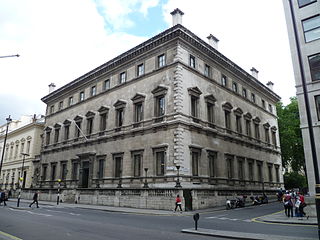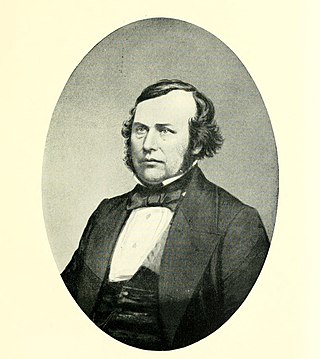
The political club is a membership based organization. Membership of a political club is an outward show of political allegiance. [1]

The political club is a membership based organization. Membership of a political club is an outward show of political allegiance. [1]

In the Victorian era the political club was synonymous with a political party. Parliamentarians therefore had to publicly say whether they are acting as a member of a political club or as a member of a political party. Notable political clubs that existed already back then include the Brooks's, and the Reform Club. [2]
The political club is a feature of Urban politics in the United States usually representing a particular party in a neighbourhood. They were most prominent in the later 19th and early 20th centuries, most famously in Tammany Hall of New York City, which adopted them during the golden age of fraternalism in reaction to a strong challenge from the United Labor Party in 1886. [3] Political clubs were associated with political machines and political boss culture, but also often saw a split between "regular" and "reform" political factions. They formerly often had a prominent local meeting house, but have declined since politics became less neighborhood-based. [4] [5] [6]

Sir Robert Peel, 2nd Baronet,, was a British Conservative statesman who served twice as Prime Minister of the United Kingdom, simultaneously serving as Chancellor of the Exchequer (1834–1835), and twice as Home Secretary. He is regarded as the father of modern British policing, owing to his founding of the Metropolitan Police Service. Peel was one of the founders of the modern Conservative Party.

The British Union of Fascists (BUF) was a British fascist political party formed in 1932 by Oswald Mosley. Mosley changed its name to the British Union of Fascists and National Socialists in 1936 and, in 1937, to the British Union. In 1939, following the start of the Second World War, the party was proscribed by the British government and in 1940 it was disbanded.

The Reform Club is a private members' club, owned and controlled by its members, on the south side of Pall Mall in central London, England. As with all of London's original gentlemen's clubs, it had an all-male membership for decades, but it was one of the first all-male clubs to change its rules to include the admission of women on equal terms in 1981. Since its foundation in 1836, the Reform Club has been the traditional home for those committed to progressive political ideas, with its membership initially consisting of Radicals and Whigs. However, it is no longer associated with any particular political party, and it now serves a purely social function.

The Carlton Club is a private members' club in the St James's area of London, England. It was the original home of the Conservative Party before the creation of Conservative Central Office. Membership of the club is by nomination and election only.

A gentlemen's club is a private social club of a type originally set up by men from Britain's upper classes in the 18th and succeeding centuries.

Liberalism in Iran or Iranian liberalism is a political ideology that traces its beginnings to the 20th century.

The Travellers Club is a private gentlemen's club situated at 106 Pall Mall in London, United Kingdom. It is the oldest of the surviving Pall Mall clubs, having been established in 1819, and one of the most exclusive. It was described as "the quintessential English gentleman's club" by the Los Angeles Times in 2004.

White's is a gentlemen's club in St James's, London. Founded in 1693 as a hot chocolate shop in Mayfair, it is the oldest gentleman's club in London. It moved to its current premises on St James's Street in 1778.

The Savile Club is a traditional gentlemen's club in London that was founded in 1868. Located in fashionable and historically significant Mayfair, its membership, past and present, includes many prominent names.

Ahmet Ağaoğlu, also known as Ahmet Bey Ağaoğlu, was a prominent Azerbaijani and naturalized Turkish politician, publicist and journalist. He was one of the founders of Pan-Turkism and liberal Kemalism.

Boodle's is a gentlemen's club in London, England, with its clubhouse located at 28 St James's Street. It was founded in January 1762 by Lord Shelburne, who later became Prime Minister of the United Kingdom and then 1st Marquess of Lansdowne.

Joseph Mordaunt Crook,, generally known as J. Mordaunt Crook, is an English architectural historian and specialist on the Georgian and Victorian periods. He is an authority on the life and work of the Victorian architect William Burges, his biography published in 1981, and reissued in 2013, has been described as "one of the most substantial studies of any Victorian architect".
The Guards Club, established in 1810, was a London Gentlemen's club for officers of the Guards Division, originally defined by the club as being the Coldstream Guards, Grenadier Guards or Scots Guards, traditionally the most socially elite section of the British Army. Officers of the Welsh and Irish Guards were not able to join until the second half of the 20th century. Its clubhouse at 70 Pall Mall was the first to be built on that street, which later became noted for its high concentration of clubs; earlier clubs had been focused on the adjoining St James's Street.

The Freedom Movement of Iran (FMI) or Liberation Movement of Iran is an Iranian pro-democracy political organization founded in 1961, by members describing themselves as "Muslims, Iranians, Constitutionalists and Mossadeghists". It is the oldest party still active in Iran and has been described as a "semi-opposition" or "loyal opposition" party. It has also been described as a "religious nationalist party".

The Junior Carlton Club was a London gentlemen's club, now dissolved, which was established in 1864 and was disbanded in 1977.

The Athenaeum is a private members' club in London, founded in 1824. It is primarily a club for men and women with intellectual interests, and particularly for those who have attained some distinction in science, engineering, literature or the arts. Humphry Davy and Michael Faraday were the first chairman and secretary and 51 Nobel Laureates have been members.

Brooks's is a gentlemen's club in St James's Street, London. It is one of the oldest and most exclusive gentlemen's clubs in the world.
The Social Liberal Forum is a pressure group and think tank which seeks to promote social liberalism within Britain. The Social Liberal Forum originated as a group that represented the centre-left within the British Liberal Democrats, but membership is now open also to people who are not members of the Liberal Democrats but who share the SLF's values and principles; since 2018 this has included liberal progressives of all parties and none. The SLF regularly organises fringe events at the twice-per-year Liberal Democrat Conference and, increasingly, provides speakers to events elsewhere.

Robert Buchanan (1813–1866) was a Scottish socialist writer and lecturer, and journalist.